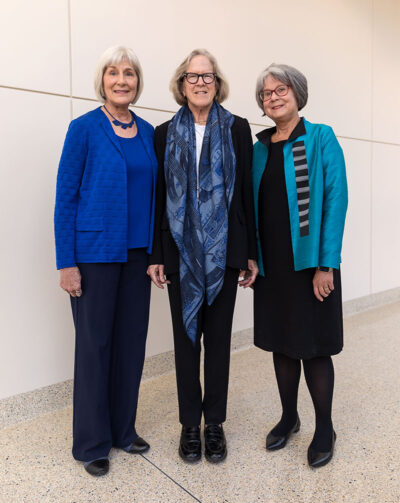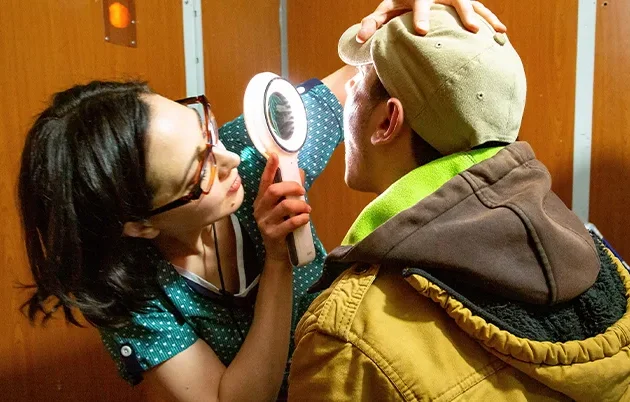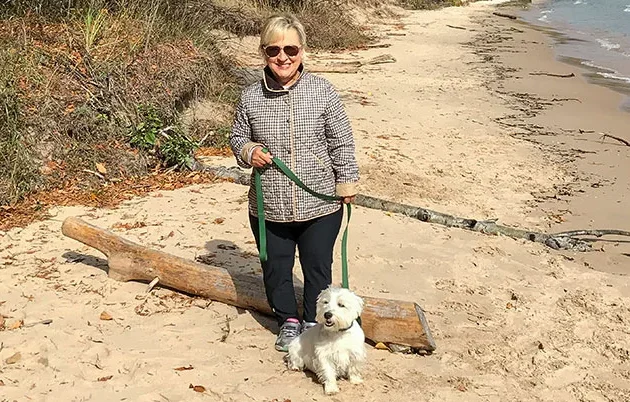“I deeply appreciate their service as highly valued advisors and partners, as they worked closely with the leadership of our school, the university, and major national organizations to advance an ambitious vision for the future of academic medicine here and throughout the country,” shared SMPH Dean Robert N. Golden, MD, upon presenting the awards. “Their impact will be felt for generations to come, serving as a foundation for the construction of a better, more inclusive school of medicine and public health that is shaped by their commitment to health equity and social justice.”
Molly Carnes, MD, MS ’01 (PG ’81)
When she earned tenure in 1990, Carnes — now an emerita professor of medicine — was the only woman tenured physician in the Department of Medicine. She set out to change that. What followed were decades of developing stellar programs devoted to recruiting and retaining women in science and medicine, and to studying women’s health and gender differences.
Noting that the Department of Medicine faculty now includes 27 female tenured professors, Carnes says, “It’s not just the numbers. They are changing the culture, making the microenvironment more supportive and inclusive.”
Her work has earned multiple awards, including the Presidential Award from the American Medical Women’s Association and the Distinguished Educator Award from the Association for Clinical and Translational Science.
Carnes earned her medical degree from the State University of New York at Buffalo. Next, she completed an internal medicine residency and geriatrics and gerontology fellowship at UW Health. Further, she earned a master’s degree in epidemiology from the SMPH.
During her training, she discovered a passion and talent for developing programs that integrate research, education, and clinical care. She helped establish the Geriatric Research, Education, and Clinical Center, which is home to internationally renowned research programs on aging, Alzheimer’s disease, and the health of older women. In 1999, Carnes and colleagues founded the UW Center for Women’s Health Research, among the first 12 federally funded National Centers of Excellence in Women’s Health Research.
She had developed a strong network of women across campus who were also investigating gender bias in science, technology, engineering, and math, which led to receiving a $3.75 million grant to establish the Women in Science and Engineering Leadership Institute (WISELI). Just before Carnes’ retirement in 2022, WISELI — known today as the Wisconsin Inclusion in Science and Engineering Leadership Institute — celebrated its 20th anniversary and was awarded the National Institutes of Health (NIH) Prize for Enhancing Faculty Gender Diversity in Biomedical and Behavioral Science.
Carnes has been proud to see many women she has mentored become leaders in academic science and medicine, and she hopes to have left a lasting legacy through her work to change the attitudes and behaviors of those who shape the culture in the Department of Medicine, SMPH, UW–Madison and beyond.
With NIH funding, she worked with faculty members in 19 departments of internal medicine across the United States to become bias-literate and use evidence-based strategies to “break the bias habit” through the Bias Reduction in Internal Medicine Initiative. This is the only multi-site, randomized controlled trial of its kind.
Regarding her perception of the state of medicine today, Carnes reflects, “I was naïve to think it was all about numbers. I had not counted on how tenacious the societal norms are that say female-gendered roles and women are of lower value than male-gendered roles and men. It’s quite discouraging. We have lots of women in leadership positions, but there remains systematic bias against women and other minoritized groups. I am pleased that awareness of the impact of stereotype-based assumptions has increased remarkably. Just look at the new Barbie movie. It makes the gendered assumptions explicit — that’s progress!”
Noting that she has been confronted by naysayers throughout her 31-year career, Carnes says, “Some of my most impactful choices, I realized, were whose words and advice I chose to believe.”
For instance, when a professor in medical school told her she was too nice to go into academic medicine, Carnes shares, “I chose not to believe him and discovered you can be nice and go into academic medicine; you just have to move to the Midwest.”
Another faculty member told her, “Women don’t have what it takes to do research.” And after she had secured a $14 million NIH grant, a consultant told her that if she wanted to succeed, she would need to stop laughing and talking with her hands.
“That criticism knocked the wind out of me — I love to laugh, and when I talk with my hands, I am honoring my father. I went home and pulled the covers over my head. Then I called my mother, who said, ‘Molly, just be yourself.’ I chose to listen to my mother.”
Carnes’ advice is, “Whatever happens, be nice, make good choices, laugh a lot and — if you want to — talk with your hands.”
She has spent decades paving the way so others can be themselves. She and her husband, Bennett Vogelman, MD (PG ’81, ’85) — an emeritus professor of medicine who was a faculty member in the Department of Medicine’s Division of Infectious Disease and director of the Internal Medicine Residency Program for 31 years — are loving retirement and are grateful to be healthy and able to continue spending time with one another.
“I have done enough,” she says. “It’s time for others to build upon what I and many others have done.”
Laurel Rice, MD
Many describe Rice — an emerita professor of obstetrics and gynecology and former chair of the Department of Obstetrics and Gynecology — as a “force of nature” who has left an indelible mark on SMPH and UW Health, as well as on women’s health in Wisconsin and beyond.
Rice earned her medical degree from the University of Colorado School of Medicine. She completed an obstetrics and gynecology residency and a gynecologic oncology fellowship at Brigham and Women’s Hospital, Harvard Medical School, in Boston.
She was recruited and served as chair of the Department of Obstetrics and Gynecology in SMPH from 2007 until her retirement in 2022.
While she served on the faculty at Harvard Medical School and the University of Virginia, Rice established herself nationally as an expert researcher, educator, and clinician in the care of women with gynecologic malignancies. She has published extensively in this area, as well as on health disparities.
Rice says she welcomed the opportunity to embrace all aspects of women’s health and make a broader contribution when she accepted the position as chair at SMPH. Throughout her career, regardless of what position she held, she maintained a deep appreciation and love of patient care, recognizing that this aspect of her career was a personal and professional privilege.
“Patient care is the bedrock upon which everything else — education, research, advocacy — rests. That was the best part of my career,” she shares.
Rice’s impact as a leader can be felt on a nationwide scale. She has lectured extensively throughout the United States and has served as president of the American Gynecological and Obstetrical Society, Society of Gynecologic Oncology, and Council of University Chairs of Obstetrics and Gynecology. Her many honors include receiving the YWCA Women of Distinction Leadership Award and being named an Ovarian Cancer Hero by CURE Magazine.
Rice also served, during her tenure as chair, as interim residency program director and vice chair of research in the Department of Obstetrics and Gynecology.
When reflecting upon her career, she says, “While I wasn’t necessarily aware of it at the time, I think one of my most meaningful contributions was mentoring junior faculty and trainees, bringing along the next generation of individuals committed to excellence in women’s health care.”
Having been an outspoken advocate for access to contraception and reproductive rights throughout her career, Rice notes that, in recent years, state and national policy changes have required her to provide leadership on an entirely different scale.
“U.S. health care has multiple misaligned forces, and we face formidable challenges. That is certainly true for women’s health. I had the privilege of working in an institution, the UW School of Medicine and Public Health, that appreciates the complexities and does its very best to push forward, maintaining the best interest of patients,” she says.
Rice has testified about the impact of legislative changes related to physician training and residency accreditation, as well as the impact on patient health and well-being. She supported the development of the UW Collaborative for Reproductive Equity (CORE), a campuswide initiative focused on reproductive health research and translation in order to address critical health care needs of women in Wisconsin.
In early 2020, as the world was temporarily shutting down due to the COVID-19 pandemic, Rice and CORE Director Jenny Higgins, PhD, MPH, co-authored an editorial opposing limited access to contraception and reproductive health by including them under the umbrella of “elective health care.” Rice also served as an investigator for a CORE study, published in the American Journal of Public Health in May 2021, that included surveys of 913 (a 67 percent response rate) of SMPH physicians about their attitudes and knowledge around reproductive health.
“Research carried out by CORE has shown that a vast majority of SMPH physicians, including all subspecialties, put the reproductive health needs of the patient first,” she reports.
Rice has been happy to pause briefly and reflect. She is especially grateful for her family, including her “great life partner” and husband, Eugene “Chip” Foley, MD, and “the apples of my eye,” children Olivia and Conor Foley.
Of her future plans, Rice hopes to devote more time to a prenatal care program she helped establish at the Peter Christensen Health Center in Lac du Flambeau, Wisconsin. Prior to creation of this program, many residents there were without basic prenatal care. Now, the Department of Obstetrics and Gynecology’s Division of Maternal-Fetal Medicine holds monthly clinics to provide consults for high-risk patients, ultrasounds, and coordination of care. A joint venture with the Maternal-Child Health Program of the Community Health Department of Lac du Flambeau, the center provides supportive, nonjudgmental, trauma-informed care.
Rice says, “The work is so important, and we are hoping to expand the program to other parts of northern Wisconsin.”
Susan Lederer, PhD ’87
Lederer, a talented historian and researcher of American medicine and public health in the 19th and 20th centuries, served as chair of the Department of Medical History and Bioethics for nearly 15 years.
As an undergraduate at Johns Hopkins University, she anticipated pursuing a career in medicine but discovered she had a passion for medical history. After receiving a bachelor of arts degree in the history of science, Lederer came to UW–Madison, where she earned master of arts and doctoral degrees, also in the history of science.
Noting that the study of animal research piqued her curiosity, she recalls, “I was fascinated by the fact that the first people who were interested in protecting human subjects in medical experimentation were people already committed to protecting animals in the laboratory. It was such an interesting phenomenon — they said that people were animals, too.”
Lederer has published multiple books and journal articles focused on the history of human experimentation, biomedical innovations, cadaver programs, blood and tissue transplantation, and informed consent.
Her first book, Subjected to Science: Human Experimentation in America Before the Second World War, published by Johns Hopkins Press in 1995, provided the first full-length history of biomedical research with human subjects from 1890 to 1940. It includes detailed accounts of experiments on healthy and unhealthy men, women, and children.
In her second book, Flesh and Blood: Organ Transplantation and Blood Transfusion in 20th Century America, published by Oxford University Press in 2008, Lederer looks at the history of organ donation, especially the ethical challenges around addressing the shortage of organs in the decades before 1954.
Lederer left UW–Madison to teach at Penn State College of Medicine and then Yale School of Medicine, but in 2008, she returned to SMPH to serve as department chair. She has become one of the school’s biggest cheerleaders.
“From my experience, I can clearly state that our school is the best school of medicine and public health,” she says. “Best students, best faculty, best staff, and best leadership.”
Lederer is especially proud of the university’s forward thinking when it established the Department of Medical History and Bioethics in 1950. She says the department may be second only to Johns Hopkins, which established its department in 1929 and holds the distinction of having the oldest academic department of the history of medicine in the English-speaking world.
“In the last five years or so, there’s been a burgeoning interest in medical humanities, but most schools are late to the table. Wisconsin has been at the forefront of integrating these topics in the medical curriculum and in conducting a lot of research in this area in our various disciplines,” she shares.
Lederer has provided incredible service at SMPH and in the nation. She was a member of the school’s Medical Student Admissions Committee for seven years, including two as its vice-chair. At the request of President Bill Clinton in 1994, she was appointed to serve on the federal Advisory Committee on Human Radiation Experiments. She also has served as the president of the American Association for the History of Medicine.
Above all, Lederer says, “I hope my legacy is the extraordinary faculty we were able to recruit and retain with the support of the Dean’s Leadership Team in SMPH. I cannot resist reminding faculty and staff about the faculty in the Department of Medical History and Bioethics and their work on some of the most important issues in the past and present.”
The department is leading the way in research around the ethics of climate change, neuroethics, animal research, the history of structural racism, issues of reproducibility in basic science research, surgical decision-making, and viral sovereignty.
While she has stepped down as chair, Lederer has no plans to stop exploring the history and ethics of medicine. She was named the Ronald L. Numbers Professor of Medical History and Bioethics by the Wisconsin Alumni Research Foundation in 2023. She will be the co-chair of the 2025 International Congress of History of Science and Technology, which will be hosted online and at the University of Otago Dunedin campus in New Zealand.
Lederer’s latest book — co-authored with Susan Lawrence, PhD, professor of history at the University of Tennessee — is scheduled for release in 2024.
With a working title of American Cadavers: 1780–1980, the book explores the history of men and women who wanted to donate their bodies to science.
Her sabbatical this past year has given Lederer more time to write. She says she always has a healthy inventory of papers she wants to publish, and the ideas keep coming.
Lederer concludes by asking the perennial question: “As medicine continues to evolve, just because you can do something, should you?”


